#Oh I have no doubt
Explore tagged Tumblr posts
Text

some epilogue vibes (an excuse to draw some hugs. and my durge so many times)
#bg3#baldur's gate 3#bg3 spoilers#baldur's gate 3 spoilers#wyll#karlach#astarion#shadowheart#lae'zel#minsc#jaheira#durge#oc: noon#anyway as said attempting to tag late game stuff more just in case#spoilers in the tags also bc i'm gonna ramble lol ->#i'mm😔having played embrace durge for most of the game all the sweetness punched me in the face (affectionate) like girllllll lol😔😭<3#tho let wyll be hugged damnit >:(#(i wonder if they added wyll hug in the new patch? doubts i don't trust like that but huge if they did)#also idk why minsc got that ending lmao. i didn't even know there were diff outcomes just found out looking for his ref for this pic LOL#i helped nine fingers and the guild helped in the endfight?? idk what happened but godspeed my guy#also loved jaheira's ''good to see you please for the love of gods remember to never have kids''#minsc in the bg: ''i'm getting executed tomorrow💯💪''#also i didn't even know why karlach glowed blue then looked it up like oh😭😔🥺 ohhhhh
3K notes
·
View notes
Text

JAYCES HAND CUPPING VIKTORS NECK OH MY GOD I NEED TO DIE
#arcane#arcane season 2#arcane act three#arcane act 3#viktor#viktor arcane#jayce talis#jayce#jayvik#jayvik you have moved me#oh my god#soulmates#literal soulmates#i hate gay people#gay ppl and their situationships#i hate them (affectionate)#i just died#i lobe you jayvik#i love you so much#did i mention i love jayvik#meant for eachother#i never doubted you jayce#jayvik canon#arcane thank you so much#arcane spoilers#why are gay people so tragic#they make me sick#they were so insane for this#guys i cant process this#what the fuck
2K notes
·
View notes
Text
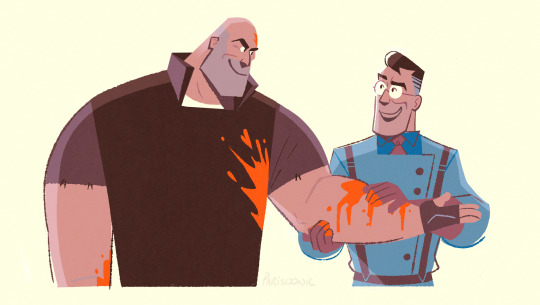
'It took four people to give you this? You're getting sloppy my friend.'
#tf2#tf2 fanart#team fortress 2#tf2 medic#tf2 heavy#heavymedic#barely been drawing outside of work lately so here's a tiny doodle#medic why are u so hard to draw i hate u#i'll fuss with this tomorrow no doubt#oh alt caption was medic revelling over the fact that this would be infected in two weeks time and the amputation date they can have lol
2K notes
·
View notes
Text

It's still interesting that TBoB called more attention to Stan's control over his mindscape (And if you go with the interpretation that the lost pages are partial truths that are heavily influenced by Bill, then he's the one insisting that only someone with training should be able to have that much control over the mind.)
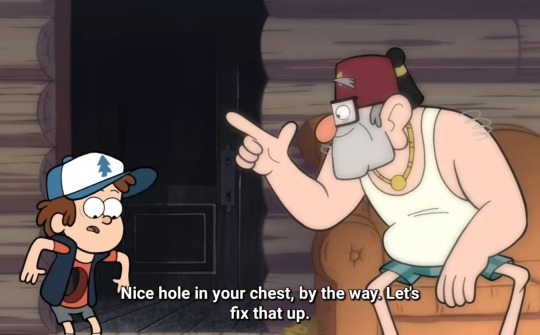
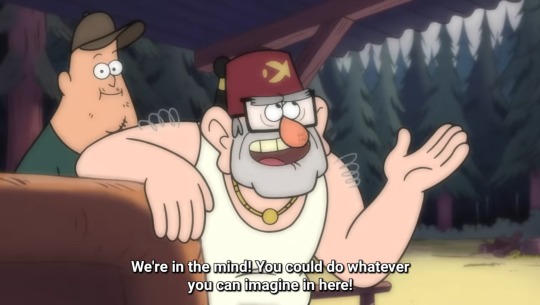
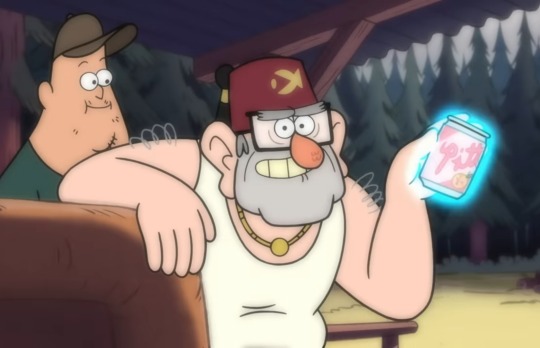
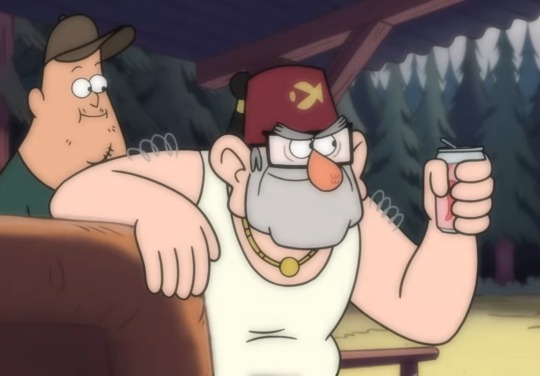
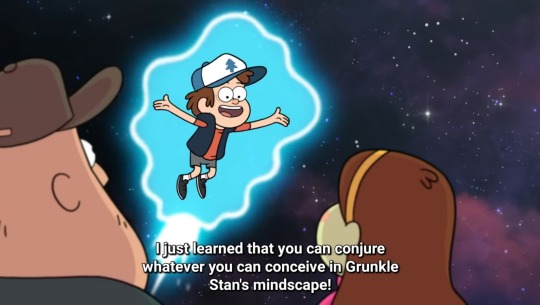

Meanwhile we have a memory!Stan. Someone who apparently knows too much and is rather aware for being a simple memory.
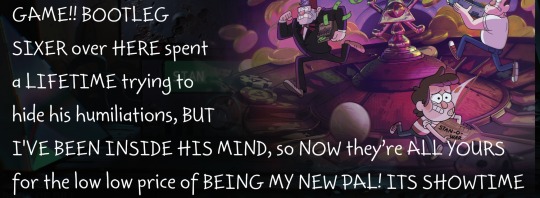
From the Wheel of Shame, we know Bill was able dig up all kinds of dirt on Stan but... that wasn't why he was there in the first place, was it?
Bill couldn't find the code immediately despite a memory of Stan opening the safe being a few hours old at most and decided to have Mabel try find it for him (The original concept of the ep had it far more hidden but this was likely cut because of time constraints)

Ford did experiments on Stan's mind which likely meant using Project Mentem and actually looking around his mindscape, and his only reaction was to comment on his jokes-- despite what little we the audience know being enough to render us sobbing wrecks
(yes I refuse to shut up about this part cos the book's intro is extremely underrated)
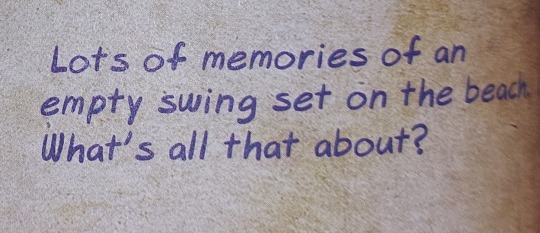
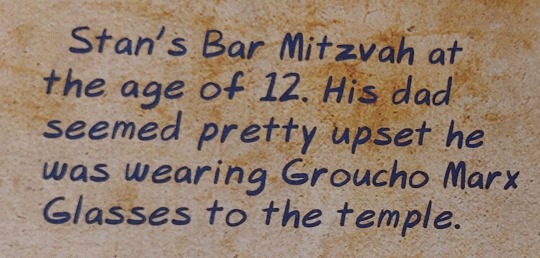
Stan was able to replace his memories of Ford with the swingset instead and managed to hide Ford in his Bar Mitzvah memory. And that's not even mentioning the lack of visible Portal and Stan o' War which noticeably show up in Ford's dreamscape (the broken swingset manifesting anyway pains me tho)
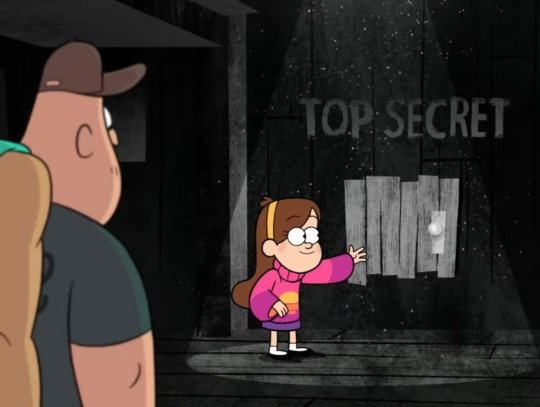
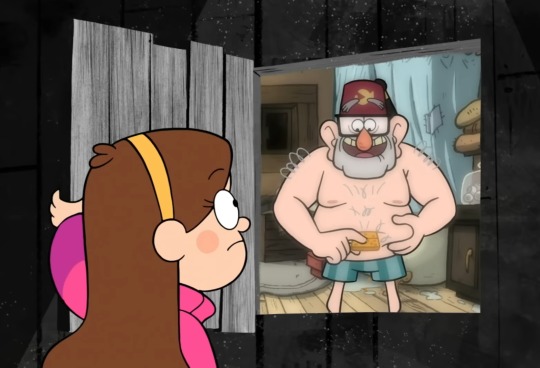
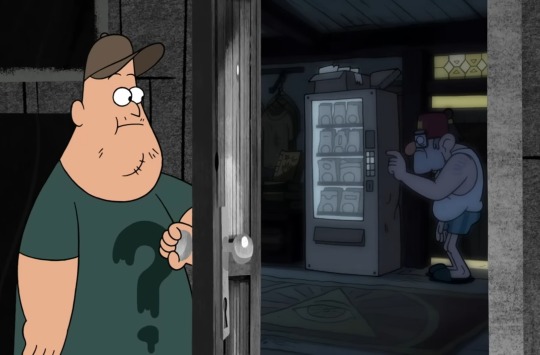
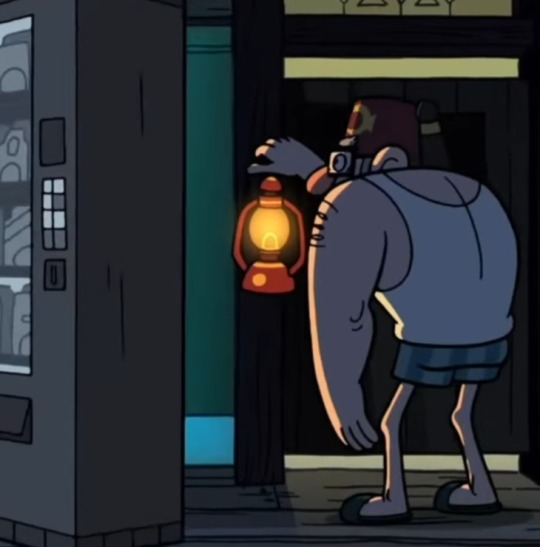
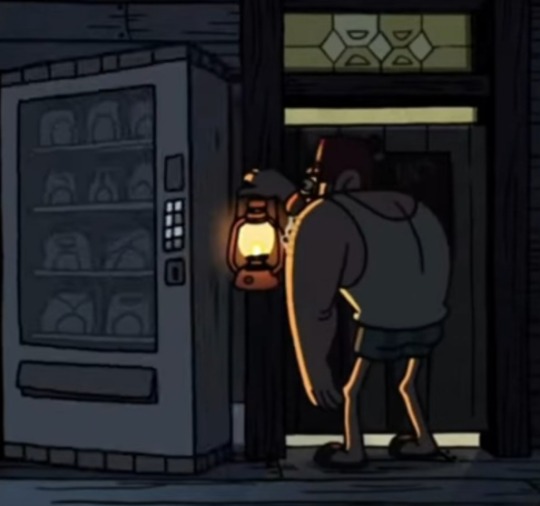
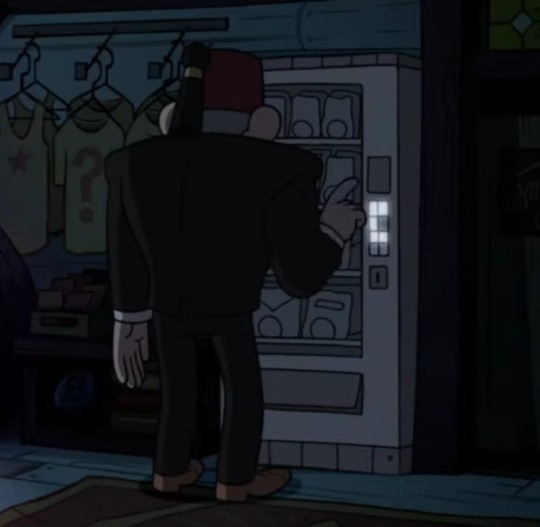
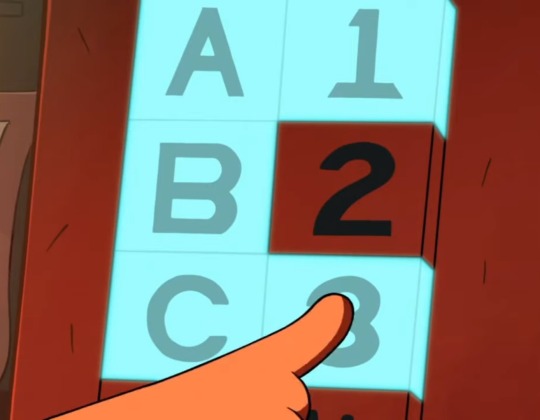
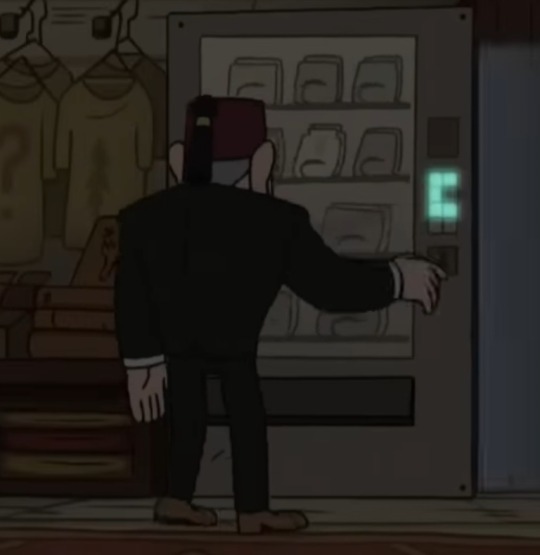
He subconsciously has misdirects for his secrets that are both silly and manages to disturb everyone too
And while Bill-as-Soos being bored by the vending machine memory is a joke that's basically the crew's way of going "hey remember the thing way back in the first ep that's going to show up in the next one?" and in-universe appears to be Stan slipping up, it's interesting that they had Stan input the wrong code when it's consistent literally every other time its inputted (especially when it shows up correctly in the very next episode)
It's even possible that the safe code that Bill found could have been a misdirect too but we'll never know since the safe got blown open by dynamite.
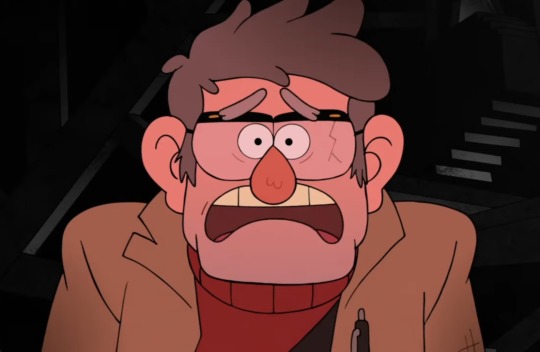

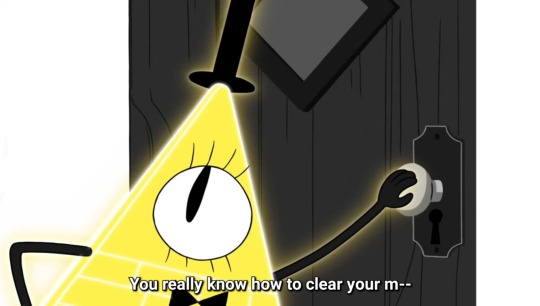
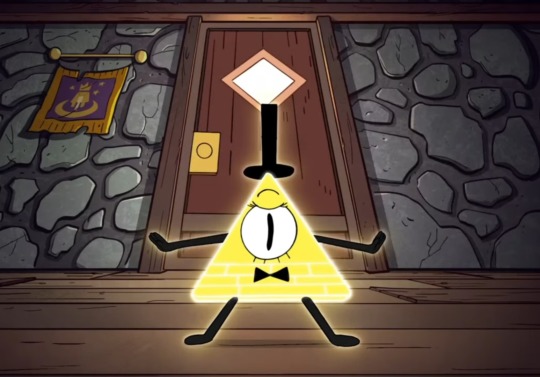
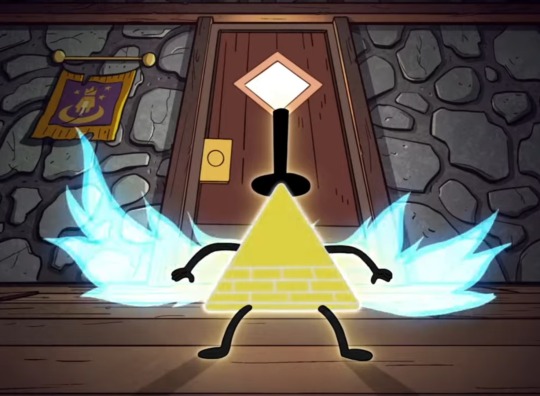
Stan was able to buy time by making his mind blank despite being genuinely terrified when Bill enters his mind (to the point that he breaks character and uses his own voice to yell), and could conjure up his living room (in colour opposed to his mind's regular greyscale) to make sure Bill didn't have enough room to flee, slamming the door in his face before the effects of the memory gun kicked in.
(EDIT: Random door analysis here)
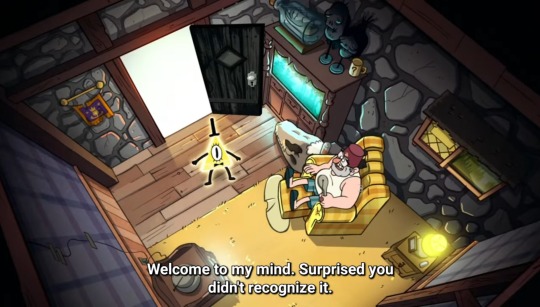
And maybe the twins eventually told him that Bill had already been inside his mind after their W3 reunion, but all we know was that his conscious self was left in the dark for ages and wasn't really aware of Bill until Weirdmageddon.
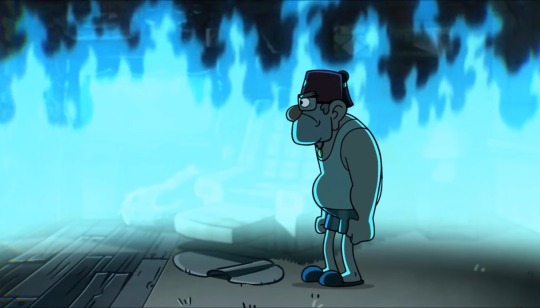
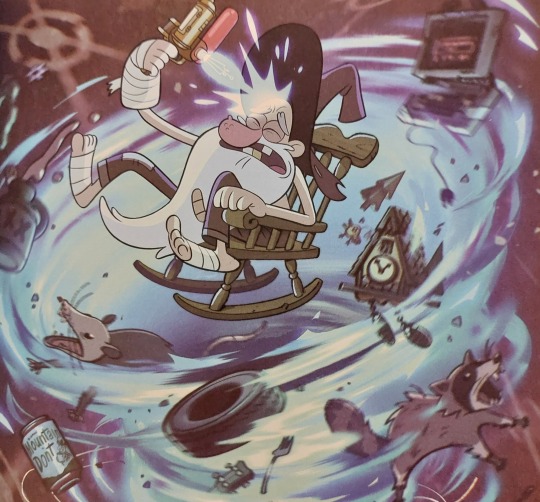

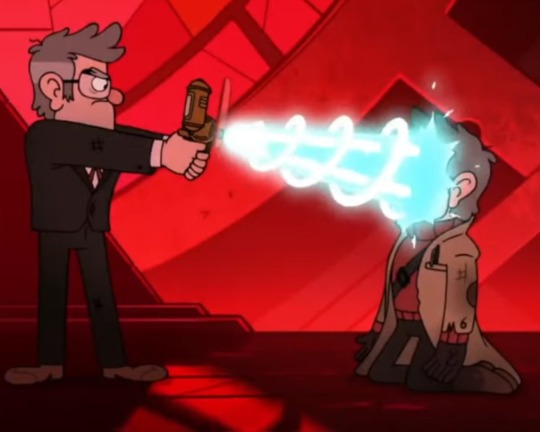
TBoB showing McGucket's dreamscape also brings up the idea of the effects of the memory gun manifesting differently to each person. To Stan's mindscape, the memory wipe manifests as blue flames which immediately brings to mind Bill's powers but it's a far lighter shade (maybe to more closely match the memory gun and its eventual fade to white?)
The end of TBoB and the website poem also firmly reminds us about Stan's connection to fire but there's also the question if Stan himself is actually aware of it...
#but also j3 having ford read dipper's entries post dd&md but not having him know about the kids' encounters with bill is so kashdskahd#cos that implies he immediately skipped the pages that mentioned stan 😭and didn't read mabel's entries#oh for him to actually react to dipper's observations about stan's mindscape....#stan pines#stanley pines#bill cipher#gravity falls#gf meta#yes of course my brain is still going ' same coin theory ooooo' at this#cos i doubt that j1 has any mention of the mindscape and it's not like stan would have studied this stuff#imagine iconic hippy hater actually mediating on purpose#i'm still waving my arms about stan potentially seeing the reader's version of tbob tho#but even if that ain't the case bill having a breakdown from him reading him like a book is still iconic#dunno if this is coherent and i'm pretty sure all this stuff is things most folks know but idk some people didn't read the journal#some folks don't know about the poem!!!! truly the biggest tragedy
1K notes
·
View notes
Text

when people think delilah just completely takes over and laudna has no control. when people think jester is just an uwu child who has been manipulated by every man she’s met. when people think vex is an empty husk of daddy issues without her brother by her side. when people think fjord is an arrogant asshole who doesn’t pay attention to the party around him. when people think scanlan saying that vox machina doesn’t care about him is an accurate assessment.
#i’m tired and i was bitching w a friend about this earlier but good grief.#cr fandom HATES when a character knowingly denies or portrays themself in a way that is false#but that fulfils the expected role the party/the fandom has dictated for them#whether the character is intentionally lying (vex and fjord esque) or has bad faithed themselves into believing what they’re saying#(laudna and scanlan) cr very frequently plays with like . the character is saying this and it’s not trueeeee#you’d think the fandom that’s oh so willing to History Is Written By The Victors their way into validating wiping out all of the gods#because (checks notes) they do not fulfil the whims of every person who asks#might have a little more grace when it comes to doubting the characters words as always truthful or always well informed#critical role
1K notes
·
View notes
Text
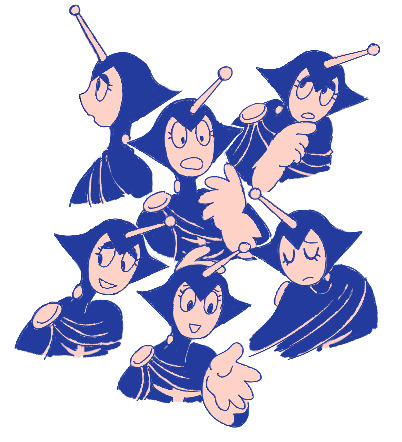



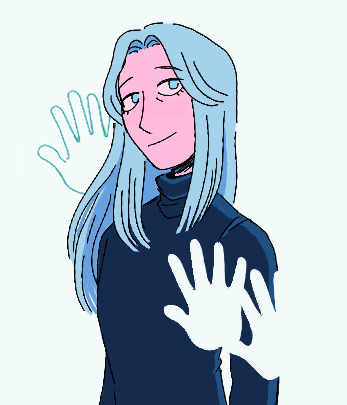
epsilons
#astro boy#tetsuwan atom#astro boy 2003#pluto anime#pluto manga#epsilon#art tag#I'm going to say something controversial. normally I would be all for gender-flipping characters in a mostly male cast-#-but I think making epsilon a woman in the 2003 anime was a major coward move.#like oh ok the character you choose to make female is the slightly cowardly pacifist defined by his nurturing heart and love of children#you dont say. how interesting#(not that 2003 epsilon even has those qualities besides the pacifism but its not like they replaced it with anything else compelling either#(as far as I know. I'm not done watching it but I only have like 8 eps left so I doubt they'll establish anything in that time)#(ok ok shut up leo)#thats not why I drew all that though I got the idea cuz they gave epsilon he pronouns again by accident in omega factor lmao#rock on gnc king
974 notes
·
View notes
Text
Ideology of Exceptionalism and Gravity Falls; meta and character analysis

I had a whole ago read a post by @icanlife that had a quote by Alex Hirsch on Ford's greatest flaw, and wanted to explore what the flaw is, which is the ideology of exceptionalism; in the exploration, I’ll touch on what it is and how it is used in abusive relationships and cults, as well as how it drives multiple Gravity Falls characters and consequently how it impacts relationships between these characters, and how the show ultimately refutes exceptionalism.
Quick note here; I am not in any way, shape or form a psychologist nor have any formal training in psychology; this is written from my own experiences with this ideology and my own forays into psychology and trauma-informed learning. It is also written with a loose understanding that is likely not broad enough to cover all references to cults, extremist groups and abusive relationships.
The Ideology of Exceptionalism
First of all, we have to get through a drier bit, which is… what is the ideology of exceptionalism and how does it arise? Might be fairly obvious, but it is the belief that you are, or belong to, a group of exceptional people, thus more important and worth more than anyone else; ie, those who don't qualify as 'exceptional'. It is often a subconsciously learned ideology. Now, what qualifies one as exceptional can be extremely varied; generally it revolves around something that provides some form of privilege. Thus, it might be, as the main exceptionalist idea in Gravity Falls, 'intelligence', or power, or it can be such things as attractiveness, quantity of money one has, species, nationality, or skin colour and ancestral heritage. The ideology of exceptionalism, being by nature hierarchical, devalues, and at its worst, openly and violently dehumanizes those who do not qualify as exceptional.
For why exceptionalism occurs is an extremely broad topic, but I've personally found that, for exceptionalism revolving around intelligence, it's a result of a poor sense of self-worth, and having one's self-worth tied to what makes one exceptional. Poor self-worth itself (again, broadly) is a result of childhood trauma from a lack of positive affirmation and unfulfillment of the emotional needs of the child. Meanwhile, self-worth becoming tied to the quality of exceptionalism generally is a result of when positive affirmation was pretty much solely provided around their 'exceptionalism', especially when provided derogatory commentary, or a blatant example of how they would be treated if they aren't 'exceptional'. As a result of the general lack of affirmation, self-worth then becomes often solely reliant on the qualities of exceptionalism, as that is the only way for the child (and later, adult) to get affirmation of their worth, as well as out of fear of being ‘not worth anything’ like the examples of ‘non-exceptional’ people they have been given.
This is especially likely to occur when the child is a social outcast; the adoption of the hierarchical ideology of exceptionalism, and the devaluation/dehumanization of others often occurs subconsciously as an avoidance/minimization tactic from pain. This is to say, the child, and later the adult (if healthy self-worth is not established) goes 'it doesn't matter what the non-exceptional people say or if they accept me since I matter more than them because of my exceptionality'. It can even be taken further, that being shunned is part of one's exceptionalism, and becomes part of the qualifier of being exceptional. For instance, 'they just can't understand because they aren't exceptional and that's just a part of being exceptional'. This idea also neatly tailors into the part of the concept of being better then others means you are separate from others; this can be taken that someone who is special, needs to be alone to be truly special.
Obviously, exceptionalism is not a healthy coping mechanism for poor self-worth, as often such people constantly feel the need to prove and show off their exceptionalism to gain that affirmation and avoid rejection, which is stressful. As well, it often negatively impacts their relationships with other people as a result of the arrogance of believing that they are better than most others, or even deliberate sabotage due to their arrogance. This occurs as they flatten the complexity of human experience to black-and-white hierarchical categories of exceptional/not-exceptional through constant judgement of those they meet, and often refuse to engage with people who don't belong to their 'exceptionality', or even people they simply don't like, even if they technically qualify. Generally, those that they do like or have close relationships with, often due to being similar, are automatically labelled as 'exceptional'. Those judged as ‘exceptional’ also become privy to the open judgements of ‘non-exceptional’ others, out of a subconscious belief by the exceptionalist that the other believes similarly; something that may strain their relationship if the other doesn’t ascribe to exceptionalism. This all culminates in the exceptionalist being blind or even adverse to the diversity of experiences, which makes it difficult to create relationships and community outside of echo chambers of their own beliefs (if they can even find this), and subsequently, these people are often isolated and have very few to no close relationships with people.
However, all humans require connections with other people, relationships where one can rely on others emotionally and physically if needed and feel accepted; they also require to feel like they are worth something, that their life has meaning. Lacking meaningful connections and having a crippled sense of self-worth, a deep yearning hole is left in these people. Exceptionalism, especially as it is a narrative constantly pushed by Western society as it validates hierarchies, is then employed as a (often subconscious) trauma response to assuage this yearning hole, with arrogance and denial. And depending on the circumstances, it can be a very strong and definitive trauma response for people.
This isolation and lack of self-worth is catnip to abusive relationships, including cults and extremist groups. These types of relationships often heavily rely on isolating their victims or pulling them into echo chambers of solely the abuser’s rhetoric, to redefine what is healthy through gaslighting; as the exceptionalists are already isolated, this makes them extremely susceptible. They also often provide these people affirmation, and in these cases especially about their exceptionalism, thus confirming their self-worth, their 'specialness', while also providing them the connection they have been lacking, either through the cult community or through the abuser’s own presence. These emotional needs, which haven’t been met in a long time, if ever, begin to be fulfilled; something that abusive relationships and cults hinge on, rather than any form of logic.
Ideology of Exceptionalism and Gravity Falls
The main characters within Gravity Falls which are heavily ascribed to exceptionalism would be both Ford and Bill; this characterization deeply impacts the story and their relationships with others (technically the Northwest are another case regarding wealth, but less directly impact the storyline and thus tangential; Gideon also is an example, but as a mirror of Bill). With each of these characters I’ll go into detail within their sections on the way they began to ascribe to exceptionalism, and how it plays out later in their relationships; I will first begin with Ford, then move to Bill. Then, to cap it off, I’ll go into the characterization of Stan and the way Gravity Falls refutes exceptionalism.
Ford and Exceptionalism
Firstly, the quote from Alex Hirsch that kicked this whole baby off, as mentioned previously;
“Ford sees Dipper as someone who’s special like himself. That’s Ford’s great flaw, his arrogance is he believes that there’s special people, and everyone else. That human attachments are actually weaknesses. And the song and dance that he’s giving Dipper right now, is the song and dance that he gave McGucket, back when they were younger… ‘You and me are different, we’re better than everyone else. We have a path that no one else can understand, and only us can do this.’ It’s a very seductive idea for Dipper… Dipper is a smart kid, but Ford’s projecting. Ford loves Dipper because he sees someone who’ll tell him ‘yes’ to everything. Who’ll never challenge him, who’ll do a really insane dangerous mission.”
Very blatantly Alex Hirsch calls Ford out on his arrogance in the belief that he is special, in his belief in the 'lone hero' complex, in his belief in exceptionalism. And really, it should be no surprise that Ford does so, considering the way he's depicted as a social outcast as a child (other than Stan), and the way his parents have been clearly shown to be not particularly emotionally supportive (“I’m not impressed”); they don't provide positive affirmation except for his intelligence (mostly due to the possibility of money making through it…), while also actively comparing him to Stan who is derogatorily ‘not-exceptional’, and ‘worth less’. This all sets Ford’s self-worth up to be fragile, and other than Stan who wholeheartedly accepts him, he is isolated and invalidated; plus, the only other validation he receives is around his intelligence. All very classically fitting the profile for exceptionalism.

Image id: Stand and Ford when they were children, both clearly enjoying each other's company.
Ford’s belief in his exceptionalism catalyzes after the shattering of his and Stan’s relationship. Previously the twins are shown to do everything together, having a very close caring relationship; something unlikely if Ford thought he was better than Stan. Also, when Ford is talked to about his opportunities, Ford looks uncomfortable at the way they talk about Stan as inferior, compared to how he himself is being praised; but in the offer he’s simultaneously finally being validated, he’s being told he’s someone worth something, and he’s going to be someone worth something after this. And then the science fair incident occurs, and Ford loses that validation from his parents, from the judges and a future of more validation; after being promised validation and acceptance, it slips through his fingers. And in his anger of being denied that, it becomes easy to begin to slip subconsciously into the rhetoric the others have been feeding him; that he’s exceptional, that Stan isn’t, and he deserved to be recognized for his worth. So he breaks the relationship with the only person who accepted and validated him for who he is. With that loss of previous support, Ford becomes then deeply obsessed with proving his exceptionalism to the world to assuage that fragile self-worth, to become accepted, or even better, revered, confirming that he is someone of worth, someone special, like he was promised.
Ford’s obsession also doubly functions as a way to alleviate his guilt over shattering their relationship; if he’s exceptional as he believes, then he’s within the right to respond the way he did, as he’s worth more than Stan, he's better off alone, and he has a right to be angry over being denied that validation. As well, in much the same way as it is used as a way to alleviate his guilt over the end of their relationship, it is also likely used in a way to minimize the pain of being ostracized (although not directly depicted); afterall, Ford’s keenly aware and insecure about his social ineptitude and his six fingers as things that make him different from other people, case in point with his experience visiting Lazy Susans Diner. Thus it wouldn’t be unsurprising if he uses the idea of being worth more than those who ostracize him to imply it ‘doesn’t matter’ what they think. His ostracization by nature keeps him from generally forming close relationships, with the exception of Fiddleford (who much like him, is socially outcast, and intelligent) during his university days. As a result, he's isolated and acutely lonely, having lost Stan.

Image id: One of the missing Journal 3 pages in TBOB, detailing Ford's botched social interaction in Lazy Susans Diner. In the background is the print of his six-fingered hand.
In his obsession over being acknowledged, Ford, like many others who believe in exceptionalism, identifies strongly with the causes of his ostracization (his intelligence, his six-fingeredness) as part of, or wholly, makes him exceptional. It is obvious through his choice of study; with the grant he has been gifted, he chooses to revolve his work around the weird, the outcast, something that you see Ford gravitate towards being an outcast and deemed 'weird' himself (which in Journal 3 he openly talks about). Something that can be, much like him, framed as 'exceptional'. His work is even recorded in a journal that Ford deliberately chooses to put his six-fingered hand on the cover of. Intertwined with the way it becomes adopted into the idea of exceptionalism, is the keen loneliness from his ostracization and a deep desire to be accepted and a wish to find a community of other weird people.

Image id: Two pages from journal 3, labelled 'Myself', in which Ford is open about being weird, and a social outcast, while also noting his ambitions and that 'Gravity Falls, [is] the place that I fit in.'
Ford and Bill
All of this culminates in Ford becoming an incredibly easy target to manipulate by Bill. He’s desperate to be acknowledged (and thus accepted) by an authority figure so that his belief in exceptionalism is justified and his self-worth confirmed. And he knows he’s intelligent, that he's exceptional because people have told him so, but he just needs to prove it with something that shakes the world. And the grant is finally his second chance after the fair, but he's stuck, and the research is going nowhere, and he's in a town where he doesn't really know anyone and he’s so terribly lonely. And sure, he clings to his exceptionalism but if he can't even prove it then is he really exceptional? Is he even worth anything like he thought he was? And what about what he's left behind, rejected, because of his exceptionalism?
And THEN he finds an incantation and he ignores the warnings because maybe, just maybe, this will be his break to get that acceptance/validation he has been chasing his whole life?
And then it's better than that.
A god, essentially, shows himself to him, an ultimate figure of authority. And he tells him that yes, he is special, he’s worth more than other people, and Bill’s only showing himself to Ford because he is so much more intelligent than anyone else. Ford is suddenly getting his exceptionalism confirmed by a god of ancient knowledge, an immensely intelligent interdimensional being, and he’s also showering him with affirmations, specifically affirmations around what Ford's fragile self-worth is based on. And even better, he's delighted by Ford's six-fingeredness; he's not put off at all, it even becomes his main nickname for Ford, just like it used to be for Stan all those years ago. On top of it all, Ford's own social ineptitude doesn't phase Bill, another thing Ford is self-conscious about; Bill's own social ineptitude as he's not human probably makes Ford feel comfortable, knowing that's not expected from him.
Through Bill, not only does Ford find someone who validates his self-worth through intelligence and even confirms to him that his weirdness is part and parcel of making him special, he also finds someone who he regularly (generally) is in contact with, who enjoys talking to him and even banters with him familiarly. Hell, Bill even deliberately goes out of his way (literally possessing a whole wack ton of rats, then dream karaoke) to celebrate his birthday with him; how long do you think Ford has simply skipped his birthday since he had no one to really celebrate it with? The loneliness, beneath his arrogance and belief in exceptionalism, is being fulfilled; for the first time since Ford was a teenager, he's fully accepted by someone, social awkwardness, six fingers, exceptionalism and all.

Image id: One of the lost pages from Journal 3 in TBOB, the 'one thing led to another' page, with Bill and Ford singing karaoke and drinking together, both clearly enjoying themselves; Bill has an arm slung around Ford's shoulders.
So it's really no surprise at all that Ford fell for this, hook line and sinker. Hell, if I was in Ford's shoes I would fall for it just as hard. And I've seen a few posts floating around talking about how Bill is bad at manipulating, and no, he's not. He was able to pinpoint exactly what Ford wanted and needed, and provided that, was charismatic enough to provide that. Again, manipulation isn't about logic. It really isn't; it's about the emotional core in people, what people lack and what you can give them to slowly reel them in to sing your dance and song. And people will ignore vast swaths of red flags when you're finally being accepted, when you're finally getting your emotional needs met at least in some way or form. It's better than not having them met at all, such as previously. So Ford worshipping Bill is really not a surprise, especially as Bill deliberately stoked it.
All of this is part of why you see Alex Hirsch call Ford's belief in his exceptionalism his greatest flaw; because it allowed him to be very easily manipulated by Bill, and by its nature kept Ford isolated from others, evident by his arrogance in assuming he knows best and refusing to see other people who aren't as 'intelligent/weird' as him as worth getting to know, listen too and even reach out to ask help from, it's him believing he has to be the lone hero as someone whose 'special'. It's something that blinds him to the danger of his work around the weirdness of gravity falls because he’s desperate to seek a place where he and his weirdness belong, and it's something that plays out in each and every relationship he has because it's something he clings to so deeply. It's what cost him his relationship with Stan, who previously accepted him completely, and, as he's disinclined to form new relationships and as Bill actively strokes his paranoia (Trust No One…), ultimately further increases the hold Bill has over him. It's only Fiddleford’s presence as he works with Ford that allows him some form of outside reference and reprieve from solely Bill’s influence, something that Bill resents deeply and is clearly jealous and angry about, even if Fiddleford is helping create the portal. And it's ultimately Fiddleford, once he was aware enough of what was happening, calls Ford out on it, seriously jeopardizing Bill's influence over Ford; but Ford is too invested in the portal, in chasing his own ambition and caught up in Bill’s manipulation to take him seriously, until the incident with the trial, and Ford beginning to hear other voices then Bill.
Ford’s Exceptionalism and Wider Relationships
Now back to how it plays out in all Ford's relationships; we've already gone over it with Bill's influence, because it made him extremely easy to manipulate, and with his disregard of Stan in favor of validation of his exceptionalism. But Ford, as pointed out by Alex Hirsch, also exerts the ideology's seductive rhetoric to both Fiddleford and Dipper (who look up to Ford) in a similar way that Bill does with him (although there is a difference of it being used intentionally and maliciously, compared to subconsciously and earnestly, even if it is problematic). Ford, with his black-and-white view of exceptionalism, sees both Fiddleford and Dipper as people who are like him; 'exceptional', and so he treats them as such, and uses this rhetoric to coerce them into helping him.
For Fiddleford, the lure is how he can change the world, how he can be finally acknowledged if he helps Ford with the portal. And it works well; he willingly chooses to leave his own work and his wife and young son, to work with Ford. Much like Ford, Fiddleford himself is also a social outcast and regularly presumed less smart than he is, and he’s got a chip on his shoulder to prove himself, to gain acknowledgement and recognition from the world at large. Although Fiddleford has a family which presumes he’s not entirely lonely like Ford is, he also clearly has deep feelings for Ford, some which are hinted to be more than just ‘friendly’ feelings; it is likely the combination of the lure of validation and spending time with Ford, a kindred spirit that accepts him and an old friend/crush, that causes him to agree (afterall, it was Ford who made Fiddleford feel accepted and choose to stay at Backupsmore). And Fiddleford’s not even considered a partner, but rather an assistant to Ford due to Ford's arrogance, and he still drops everything to go! It’s more about their relationship and connection rather than validation, but that doesn’t stop Ford from espousing exceptionalism. And this is a distinguishing difference, because although Fiddleford would like recognition, he’s not there solely because of it; he’s not a believer in exceptionalism nor arrogant about his skills, and so, unlike Ford who is blinded by his obsession, he’s much more aware of the dangers of the weirdness of Gravity Falls. Thus, he's actively calculating the risks involved, and when he realizes there could be potentially devastating consequences of the portal, he attempts to talk Ford out of it; this fails due to Ford’s own denial and obsession over the portal. In the end, it all goes terribly sideways, and Fiddleford ends up losing everything he had; his wife, his son, his friend, his memories and himself to the trauma he had experienced at the invitation of his friend with the lure of validation and company, due to the memory gun he had created himself.
As for Dipper, much like Ford, he also has issues with self-worth (many of the episodes deal with Dipper finding self-worth; ie, the manotaur episode), has a physical oddity (his birthmark) and by far the trait he relies on most for worth is his intelligence (for example, in one episode he rubs it into Mabel's face over and over again in beating her in games). He's also extremely desperate to be recognized by authority figures as someone intelligent, case in point when he summons the dead after being made fun of by the government agents to try and show them that the information he's gathered is important after Stan dismisses his knowledge. This desperation to be seen as someone of worth from Dipper, much like Ford, extends to the need to be a hero, something he even says at the end of the zombie episode; yet, due to Mabel, unlike Ford he's not a lone hero, and Mabel also half the time acts as the hero.

Image id: Zombies crawling out of a crack after Dipper summons them; Dipper and the two agents look on in horror.
It all culminates in Dipper hero-worshipping Ford when he returns; really, no different than Ford worshipping Bill. And Ford clearly finds it extremely flattering; Dipper's attention and amazement of him feeds his exceptionalism. Exactly how Ford responded to Bill, Dipper is willing to do anything for Ford, excited too, in an attempt to impress Ford and be validated and accepted. And for Ford, that's an extremely heady feeling, especially as someone who has been constantly alone the last 30 years, especially when he had one previously confirm his exceptionalism all those years ago and stopped, and now someone is once again affirming that idea. And Ford doesn't have to be alone again, because he's found a kindred spirit in Dipper as his assistant, someone ‘just’ like him, someone who is exceptional. Because he sees himself in Dipper, he begins to espouse exceptionalism unconsciously, by praising Dipper's own intellect and adventurous spirit, assuaging his feeling of self-worth, while also telling him he's more important or better than others because of it.
And it's seductive to Dipper, because he wants to hear those affirmations of his self-worth, especially as he hero-worships him, but Dipper isn't sold on it, because it means leaving Mabel behind, it means believing that he's worth more than Mabel (and also, Stan, and all his friends he’s made in Gravity Falls). It's ultimately because of his relationship with Mabel that he rejects the ideology; he's not isolated the way Ford was with Bill, and he's not willing to break that relationship for that acknowledgement, because his relationships matter more to him.
Bill and Exceptionalism
Now of course, that's only on the Pines; what about Bill?
While it's obvious that Bill uses exceptionalism as a main manipulative tactic, it's not just an ideology he sprouts emptily; it's also an ideology he believes in, just like Ford, although it's less based on intellectual exceptionalism, and more on power and 'weirdness'.
This most distinctly can be seen in Bill's denial about what happened to his home dimension; Bill's belief in his exceptionalism occurs as a pain avoidance tactic from killing his whole dimension. Bill was clearly a social outcast within his dimension due to being able to see 3d; he's not accepted, and not trusted, to the point that there is medical intervention to make him blind. That's a deeply traumatic experience that completely erases one sense of self-worth, where one’s sanity is called into question by your parents on something that is not harmful, that's beautiful and you just want to share with them. It's a deep and clear rejection of who Bill is, and his ability. As a result, out of a desperate bid to be understood and accepted, he ends up trying to show them the stars. And it ends up killing everyone.

Image id: Page of TBOB, on 'The Early Years' which notes that Bill was an oddity for seeing 3d, something that was illegal to speak about. Bill frames it as something that made him 'special' and better than all the others.
Traumatized, and originally rejected by the dimension, he instead weaves an excuse of exceptionalism; that it doesn't matter what he did to them because he's exceptional and he's worth more than all of them because he can see 3d, because he's powerful, so he shouldn't/'doesn't' feel any remorse about it. With such a traumatic result of trying to be accepted by people, he rejects the idea of trying to be accepted for who he really is; instead adopting a facade of a monster that he believes he is (and eventually, becomes).
Even if he clings to the delusion of exceptionalism, and shuns attempts to find true acceptance, he still wants it; and that's where his henchmaniacs fit in, as they're all, as Bill's noted when trying desperately to get Ford to join him, weird; each has something 'wrong' with them, which is why Bill accepted them as his lackeys (although it's not like we know the context around these). It's a surface-level acceptance however, one more predicated on fear than emotional acceptance. He's taken his 'weirdness', much like many do who believe in exceptionalism,as ‘part of what makes him exceptional'.
In the same way that Ford wants to show the world that he's smart and intelligent by building the portal, Bill does so by wreaking havoc and taking over existences as a way to show the world that he's powerful, that he's someone to be reckoned with, that he's not someone to be ignored because he's someone who's worth more than others. If you can't be loved and accepted, then being hated and feared is better than being ignored; acknowledgement at least approaches acceptance, it's validation of some sort of worth. It also functions as deliberate self-sabotage of his morals, by proving that he is the monster that killed his entire dimension; if that's what he is, then that's who he's going to be, because if he wasn’t, then he has to come face to face with his remorse over what he did to his dimension and his whole house of cards around his exceptionalism and not caring collapses. So instead he keeps feeding the delusions the denial, and lies and lies and lies and keeps lying to ignore all of it, to wrap himself in this shroud of exceptionalism and brutality as a way to function. And it somewhat works, because he's mostly deluded himself about it all, even if subconsciously he knows.
And of course, this display of Bill's exceptionalism is what brings Bill to earth, to Gravity Falls, and to manipulating humans. In meddling with earth and humanity, beyond Bill's goal of taking over earth and fleeing his own unravelling dimension, he also enjoys reaping the benefits of being worshiped by humans, who find him awe-inspiring. Their amazement of who he is, and Bill's own posturing and manipulation of people leads to Bill literally forming cults (ie ciphertology) or having apprentices that worship/find him (to varying degree) inspiring; all reinforcing his feelings of exceptionalism.
Of course, Ford numbers among these people; he praises Bill and worships him, as he's played like a fiddle by Bill, because his self-worth and belief in exceptionalism is fucked up in a way that perfectly resonates with Bill’s. Because it's the exact same types of issues around self-worth, around being an outcast, being weird and wrong physically, and yet at the same time gifted. And Ford clearly is incredibly lonely and yearning for acceptance, but so is Bill; since the beginning he's been trying to find someone who would accept him, even if he's given up on it. And for his song and dance to entice Ford in, he pretends he's not crushed dimensions for fun, that he's not a 'monster'; a version of him he buried after he had tried to show his parents the stars, one that he occasionally resurrects and puppets around for manipulation (all lies are better when they have a grain of truth). And this version of him is worshipped, but above all is accepted, is loved by Ford. The softer parts of Bill, even if they are still weird as fuck, the parts that were never far beneath the surface for all his deluding, become loved by Ford. Much as Ford becomes hooked on Bill’s praise, Bill also becomes hooked on Ford's genuine love and care. It becomes personal, unlike any previous ‘inspirations’ and Bill over time gets to the point that he feels accepted, safe enough with Ford to share about his dimension much more close to the truth then he did with any of his henchmaniacs. He becomes vulnerable with Ford, in response to Ford’s own vulnerability with him. He’s finding acceptance for the first time in his life around the softer parts of himself, not just the feared acknowledgement that comes from his dimensions conquering; much like Ford is finally finding companionship and acceptance with Bill, not just only intellectual validation. Bill's also for once, not just self-serving; he cares, and goes out of his way to take time with Ford, even celebrating Ford's birthday (in the unique way he does things), both with the rats and the karaoke.

Image id: One of the lost Journal 3 pages in TBOB. Ford recounts Bill talking about the destruction of his dimension, and calls himself by implication a monster.
They're both fulfilling each other's emotional needs, needs which both of them have struggled with most, if not all of their lives (although their relationship is certainly not healthy, considering it's codependent as fuck, riddled with exceptionalism and oodles of power imbalance issues). And suddenly, against Bill's plans, Ford's no longer just a disposable pawn, but someone Bill wants as part of his team, someone by his side, closer than his henchmaniacs are. He's unwittingly fallen for Ford, and so when everything goes sideways in his plan, and Ford swears it off, suddenly cutting off their relationship and that acceptance Bill had finally felt, he spirals into grief and anger from the rejection. As a result, he becomes extremely abusive to Ford in desperate attempts to continue their relationship, and ultimately he becomes obsessive over Ford joining him again as Ford continues to refuse, as evidenced by both Weirdmageddon and the Book of Bill.
Stanley Pines, and the Refuting of Exceptionalism
Exceptionalism, being a negative driving factor behind many core character dynamics, is ultimately refuted by the show. This occurs multiple times over the show, such as with Mabel in the Pioneer Day episode, especially compared to Pacifica, but mostly through Stan's characterization. Stan is someone who has been since the beginning characterized (if lovingly so) as someone who is a failure by societal standards; he’s an older man running a run-down tacky tourist shop to swindle gullible tourists out of their money, has multiple divorces, has an ongoing feud with a literal 12 year old, clearly has had multiple mishaps with the law (some ongoing), is generally pretty self-serving and is extremely lonely and really had no close relationships until Mabel and Dipper showed up. He's not exceptional; he's not even what we would consider 'decent' enough to have a 'typical, hard working job’. In short, he’s a failure, a stark difference to the idea of 'exceptionalism' that characterizes Ford. If he's gifted in any area, it would be charisma (debatedly), not anything else.
But it's still Stan who rebuilds the portal from literally only one journal (not all three!) and gets it to work. It even seems like he only needs some codes from the other two journals when he does get them, suggesting that he was able to extrapolate from what was left and the first journal’s blueprints to fix it entirely, something that is extremely difficult and technically complicated (Ford, Bill and Fiddleford all worked on it together!). Stan's able to do it, even if it's been shown he's not 'naturally' gifted in that area. And it's something he does as a result of his deep care for Ford; because even after their fights, he cares about Ford and wants to right his wrongs, believes he should, because of his whole life of being defined as a failure and even worse than that, screwing up his ‘exceptional’ brother’s life. And he’ll do it even if that means learning how to build an interdimensional portal, even if it takes up thirty years of his life doing so, and he doesn't waver. Much of this is connected to his own complexes around being deemed a failure compared to Ford, having failed to succeed in his life, and how he feels that he needs to atone for screwing up Ford’s life, now for the second time; but beneath it all, he also cares. Much like Ford, he's extremely lonely, but he's not blinded by Ford's arrogance, and as a result he wants to make sure Ford's safe, because that's what he used to do, they’re twins, they grew up together, they once they had fully accepted and cared for each other, and dammit that still means something, and Stan hasn't found that depth of emotional connection since. So if possible, he wants to rekindle that closeness they had, but first, he needs to bring Ford back.
And in the end, it's not Ford's own special gun he built using his intelligence that 'kills' Bill. It's Stan, someone who Ford had long ago broke it off with in search of validation of his exceptionalism, someone who both Ford and Bill labelled as 'not-exceptional', who defeats Bill. It's exceptionalism's devaluation of people who are 'not-exceptional' that causes Bill to underestimate the Pines beyond Ford, and it's only when Ford put aside his exceptionalism and his refusal to accept and trust 'non-exceptional' people, that is, trust Stan once more, that causes Bill to end up defeated by Stan.
In the end, it's not about who's 'smarter'; it's a reminder that everyone has different skills and are better at different things, but that doesn't diminish one's worth or value, and that just because someone isn't naturally 'gifted' in an area doesn't mean they can't learn or use different ways to get around obstacles. Ultimately, it comes down to that no one is worth more or less than other people; exceptionalism is a lie. It’s a lie and an excuse, and it's certainly not a healthy way to assuage one's poor self-worth. What does matter is creating positive healthy connections with other people, and caring about them. This creates a community where you can be yourself and be emotionally fulfilled through these connections; and when opposition does arise, you become able to fight it together, and fight so much stronger than if you are alone.
And by the end of the show, you see that. Ford begins to let go of the ideal of exceptionalism and its black-and-white categorization; finally recognizes his own faults around prioritizing validation of his intelligence and exceptionalism over his relationships, and finally, after all the years, chooses to create and rekindle positive relationships with people, trust people, and make amends. And in the end, he goes sailing with Stan, prioritizing their relationship, finally fulfilling their childhood promise.

Image id: One of the pages written by Ford into TBOB. Ford refutes Bill's idea of happiness, and says he has finally found his own happiness, and it looks like the photo taped in, of Stan, Ford, Dipper, Mabel, Soos and Wendy, all smiling together.
TLDR: Exceptionalism, an ideology of categorizing people into being special and worth more vs plebian and worth less, is a trauma response and subconscious ideology that characterizes Ford and Bill’s lives, deeply impacting all their relationships as it is used to coerce people into doing what they want, makes Ford easily manipulated, and breaks relationships through their arrogance. It is ultimately denounced through the way Dipper chooses to reject Ford’s offer and his rhetoric of being exceptional, and through the way it's not Ford’s intelligence, but rather Stan, who has been labeled as 'not-exceptional' and a failure at life, that defeats Bill through trickery. It's a reminder that everyone has worth, and no one is worth more than other people, even if one may be gifted in certain areas; the ideology of exceptionalism is fragile and a lie. In the end, creating a caring, loving community around oneself is where strength truly lies, as is seen with the deep care and love the characters have for each other, and the repairing of Ford and Stans relationship.
Thanks to the lovely @eshtaresht who deigned to beta read this monster of a post for me
If you enjoyed this meta, (first of all if you read all this you're a champ!) I've also done another gf meta post! (It's shorter I swear)
#gravity falls#ford pines#stanford pines#bill cipher#stanley pines#stan pines#hugin rambles#hugin rambles gf#journal 3#the book of bill#thisisnotawebsitedotcom#billford#fordsquared#gravity falls analysis#gravity falls meta#book of bill#tbob#christ its so long whyyyy#also oh nooo i wanna do another thing but SPECIFICALLY on trust. gravity falls is ultimately about strength in community and hnnnghhhhh#that makes me wanna cry#also i had so many thoughts. also on the denial part of exceptionalism??? oh baby Bill fucking LISTS it in his book#like sir. please#anyways i love media analysis and im totally normal about all these characters#also like Fiddleford is. like. yikes man.#anyways uhm. does dropping a 6k essay post make me sexy? please say yes (i HIGHLY doubt it#sheesh who's got time to read all this... psssspsspspp theres PHOTOS that TOTALLY dont have more reading in rhem nawwww#i totally dont know what ur talking about mhmmm#if youre like is this about gifted kids- yes. yeah. i just didnt name it. its also about wider things but. yeah#also. unofficial title? Gravity Falls and Gifted Kid Issues an analysis#oh boy sure hope my post about gifted kid issues is a hit on the gifted kid issues site
651 notes
·
View notes
Text
It is WILD to me how many people just loudly broadcast their intention to scab, as if that isn't the fastest way to brand yourself as someone who will throw anyone else to the wolves in an industry that runs on collaboration, so every writer say it with me
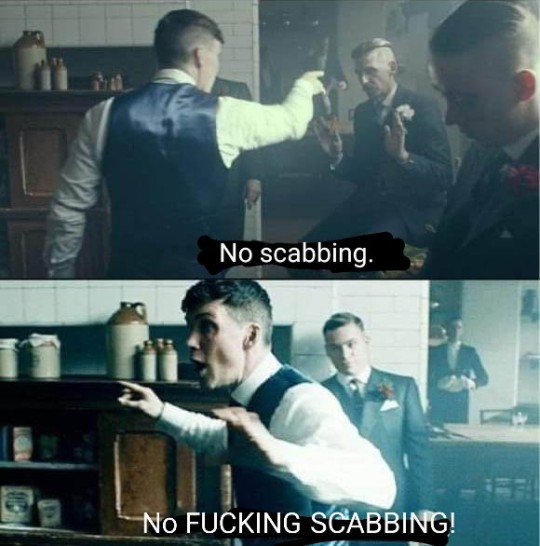
#tbh i doubt most of these people even have offers to scab. so they're REALLY just fucking themselves here.#like this doesn't even apply to me cuz it's not like I'm on anyone's radar at this point but good lord#do you wanna make rent in six months? five years from now? don't undermine the guild and dont shoot yourself in the foot! oh my god!#edited to make it more clear in the post that SCABBING IS A SHIT MOVE NOT JUST CUZ ITLL GET YOU PERSONALLY BLACKLISTED
6K notes
·
View notes
Text


Started a new book series, and has been a journey...an Odyssey, if you will.
#poorly drawn odyssey#the odyssey#Athena#telemachus#penelope#odysseus#calypso#I also drew Phemius the bard and Antinous the leader of the suitors but I'll hold onto those for a while longer.#The Odyssey has been on my reading list for ages and I finally decided to just dive into the Robert Fagles translation.#*nobody* ever talks about how damn funny the Odyssey is. Oh my god. I have been howling.#The poor bard doomed to keep playing for this unending feast. The most unwilling court jester.#Penelope being introduced by her crying about how much she 'hates this song'.#And Telemachus is the goodest lad. The OG protag to set about on his heroes journey.#He is kind! He is soft! He yearns for adventure and finding out the truth! He wants to get back at his bullies!#He even gets a companion named Mentor. THE original mentor! Who is *totally* not a god by the way. Just a guy.#Not to mention how much Odysseus gets hyped up only for his first appearance to be him sobbing non-stop.#Honestly I was mostly motivated by the need to do research for a personal project but I've been having the best time.#I sincerely doubt my current audience has any overlap with classic Greek literature but expect a few more PD-Odyssey posts.#(Yes - I am familiar with Epic the Musical; this is not fanart of that adaptation).
815 notes
·
View notes
Text
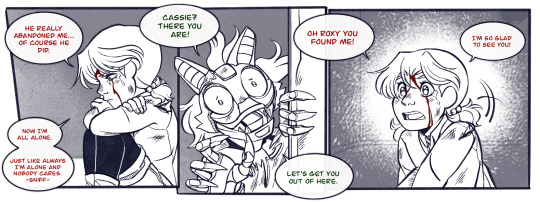
Well we heard Roxy during the end credits of the elevator ending so I don’t think she died … she is hurt in every level but she got her emo Barbie emotional support wolf at least ✨
#also I seriously still freaking doubt that’s Gregory#but i keep thinking about Gregory having yellow eyes and Helpy too when he gets corrupted#maybe Im overthinking#hahah…#fnaf#five nights at freddy’s#security breach#ruin dlc#Cassie#roxanne wolf#uhhhh#oh!#spoilers#as you can see the art block is still biting my ass FNKDNFNT#but Yipee#pix doodles
4K notes
·
View notes
Text
I love how people's response to critiques about the companions not noticing or being supportive of Rook's mental health is "you're too stupid" and "you don't understand the game like I do" and "here's my headcanon why you're wrong."
Why are y'all doing all the heavy lifting for the writing and then giving all the credits to the writing.
"Emmrich is taking you to the graveyard to help with Varric's death."
WHERE IN THE TEXT DOES IT SAY THAT. Does Emmrich even know how close Rook was to Varric? That's a nice headcanon to infer, and it would make a LOT of sense. But this is literally the "tell don't show" game, where they tell you everything three times, unless it has to do with Rook's mental health, and then it's suddenly secretly an understated genius story that I just don't understand because I'm too stupid? Okay?
No, it's once again the framework of something great that is ultimately unfinished and underutilized and a lot of people are doing the heavy-lifting for the plot and seeing their heavy-lifted headcanons propelled across the fandom, and then thinking that's just what the text says. When it does not.
I do think this is also a result of the later half of the 2nd act and all of the 3rd act being really good. Like, the later parts of this game are so good that it has me doubting my sanity about the first parts, but then I replay it and go "lol no it was bad."
#i don't appreciate people basically acting like everyone who has issues with the writing are somehow missing something special and crucial#it's extremely fucking rude#like no the “subtlety” of Rook's mental health is that it's not written at all in the first two acts and then given 1 short scene in the#third act. that's not subtlety that's doing NOTHING WITH THE MATERIAL YOU HAVE#they could have DONE SO MUCH WITH THAT PLOT#it actually makes me want to cry because you know the last game i played with this kind of plot????? FUCKING OMORI#OMORI IS THE LAST GAME I PLAYED LIKE THIS#I WAS EXPECTING OMORI LEVELS OF DIVING INTO HALLUCINATIONS#I was FULLY ready for Rook to have psychosis!!!!!!!!!#what I got was such a slap to the fucking face#We could have had MORE hallucinations#Solas's blood magic could have started degrading Rook's mental health and faculties#the fucKING CARETAKER MIGHT HAVE BECOME ACTUALLY RELEVANT#datv critical#do i sound angry. ok i cant lie i'm a little angry. i hate it when ppl make me doubt my sanity a normal amount. speaking as a sane person#edit: i'm also going to add that a lot of these end up veering into ableist territories#you can disagree with a take without saying shit about people's eyes and brains and ability to read#some people literally Do struggle to understand shit#NO they should not have to keep their mouths shut bc some ASSHOLES on the internet love to have an “idiot” to laugh at#some people DO struggle to read donald! thats why they go online and ask questions! sometimes they miss shit!#“bUt THey mAdE iT sO oBvIouS” and so what? they missed it. oh spare your poor heart. a person missed a detail. this must be so hard for you
208 notes
·
View notes
Text
Journey gave an agreeing nod. People were going to do what they always thought was the way to do things. Of course, not every way was always the right way, as not everyone had experiences that were the same. Certain trauma's in their lives that made some choose choices, others could never. He eyed Astrid as they continued "Heh. Maybe that's just the way it is. The easier life becomes, it might also becoming harder in other ways. Technology is both a very wonderful, but very terrifying thing, overall. Just think if Skynet ever happened." He teased with a slight smirk and a shake of his head. But he could certainly agree, most social interacting had to do with peacocking. Luring anyone in with the fantastical colors of you. Some did not like your color, and others did. Some had fake colors that had to be chipped away at "I think it's good, to not be liked all the time, to not have to-you know...pretend all the time. I think that's what phones or the internet, certainly might have lead to a detachment of authenticity."
He shrugged, grinning a little, he further listened to Astrid's next questions? Glancing to the side he considered this for a moment "Perhaps, I guess- Art, or writing...Which I've been doing, sooo." Looking at them, he nodded at the explanation of trauma "Right. Yeah. -It is like that. Sometimes someone can come along, maybe someones, that can help lift the baggage, and you might be that person, too." Letting out a breath though, he tilt his head down "Then their are those...who come along, to add more." Thinking back to his family the final holiday they had spent together, he started to remember before diverting his thoughts. Lifting his head at their question he thought briefly before shaking his head "Not so much, I think. I think I'd just be okay with being content, for the most part."
Blinking at Astrid's next comment, he laughed lightly "Ahh- Well I guess that really just depends on just how many people are living their lives. Or are living the lives they believe is expected of them." He had known early in his life that expectations, especially great one's, were often a heavy burden, and misleading of who one actually was, or wanted to be. But the pressure put on those with great expectations, especially so young, ended up crushing nearly everyone before they could form who they really were, under the shell of who they pretended to be, wearing the mask society expected of them. Rather than indulging and setting themselves free. ....Annd then their were certain indulgements best left unindulged. He listened still as they went on, nodding along with their words. Though their question on accidents he shyly glances to one side, lying then "No, of course not." Badly, jokingly. He shook his head slightly "I'm not accident prone or clumsy at all. Actually."
Giving a gentle nod of his head at them, he blinks, offering a serene look briefly on his face, before saying "Well, sculpting easy. Get some clay. And then empty your thoughts, and bleed." Shrugging he gave a cheeky grin "But, Yeah, I'll show you." Nodding toward Astrid then, as he told them this. As they answered his question, he squint slightly, thought he understood what they were saying "Nothing wrong with that. I sometimes tend to wander off myself." As Astrid further explained what they did when they went along spending time alone from others, he nodded. Journey could understand, still "Ah- you know, it's often much better to just be, in your own home. Without others. Nothing entirely wrong with it." Vacations often left him homesick, for the most part, anyway.
With Astrids remark he gestured his left hand toward them in a 'you see' kind of movement "Exactly." But as they spoke on zombies possibly being a thing that could happen he nodded "Probably. I'm not really a corpse guy, whatever dead thing's coming at me, is getting whacked with a shovel, that's all I have to say." Journey continued to listened to Astrid, acknowledging their words " Huh. Yeah? I think a lot of people are more cause up in waiting for their chance to speak and correct others, than they are in actually listening to what they are, or the other person, is actually saying in a lot of conversations." Laughing a bit, he coughs lightly, bringing his left hand up to his mouth for a moment.
At Astrid's insistence, he nodded "Alright. Alright." Raising his hands up a moment he shook them slightly. But bringing up that he could have died he paused, inhaling deeply and staring to one side "It's become a common part of my daily life, honestly." Certainly since the fire... Swallowing thickly, he grinned as they went on, ducking his head slightly "Yes. She did, it was what I needed to make me who I am now. I don't think I'm too terrible, right? So it worked."
"I could. But I could also add more." He teased the idea. At their next comment he shook his head "Hell no. Nothings going to keep me here outside of extreme weather or serious injury." He muttered. Though he stood and walked toward the door "Finish your sheet, I'll be back with your book." He assured before slipping out into the parking lot.


“ i guess, people can’t help being who they are, no matter what. doesn’t matter what they do, doesn’t matter what their personality is, they’re just . . the way that they’ve reconstructed themselves, i guess. ” a cynical way to put it, but it’s astrid’s truth, in fact. that’s how they feel – that’s how they’ve always seen the world for what it is now. “ or isolated people into their phones, you never know. most people claim to be antisocial, but prefer being on their phones, like some sort of sick, twisted way of stockholm syndrome, ” they were honestly never one for full communication, considering most things that were ’ wrong ’ with them & their ideologies of the people they’ve claimed to surround themselves with. “ whatever people think, you know? to ensure that they get the right audience or whatever the hell they’re looking for. ” astrid’s never been like that, seeing how they’re somewhat well off on their own, that they’ve never entirely needed the validation of pure strangers, or things like that. & they’re happy about it because they don’t need to severely bump themselves in with the rest of the world, they don’t need to see it from anyone else’s view except for their own, they’ve gathered.
casually dated, it wasn’t all that. not great of a relationship enough for astrid to constantly think about it, however, it was still a nice mention for them to put out there. plus, it wasn’t like they were ever going to see their ex – whatever else he could’ve been. “ then, what else did you see yourself doing? ” astrid’s asking, wondering if they could see themselves being an archaeologist for however long they were thinking of doing it. or if it was the right thing for them, which, they were completely sure it was, in fact. “ we all have trauma, just from different things. doesn’t make us . . any worse or good than anyone else, kinda just means that we’re good at coasting through life with baggage. that’s all it is, baggage. ” of course, they knew because they had a ton of it : some things weren’t meant to be told to others, astrid’s concluded – because the few times it happened, people managed to stray away. or they do, seeing how they’ve kept distant.
“ are you one of those people –, who want happiness? ” they’re going, fully interested in his answer. truth be told, astrid doesn’t know what they want, specifically. they’re scared of the pure commitment that is happiness itself, not wanting to get out of their cynical patterns, nor their behavior of it all. “ who needs a social life when you’re living life, as it is? ”
astrid’s laughing light, finding themselves lost in this, nodding their head to his words. “ we could, there’s no sin in that, ” they’re letting out, continuing to hear his voice, keeping themselves composed, proper – something someone would say if they were looking at them in this very moment. “ have you had prior experiences to accidents, journey? ” now, this – this causes another deep interest for astrid, with mentally keeping notes on him since the car crash, though, astrid isn’t judging if he did, it happens. people get into accidents with strangers, however, they don’t go out to dinner with them & plan dates, that was the only downside. “ thank you . . for that, ” astrid breathes, taking a mere second to process what happened. he gave them a compliment without sounding the least bit sarcastic, that’s something not a lot of people did, at least, not the ones that they’ve approached & whatnot. “ i’ve never sculpted before, would you mind showing me how it works? ” a hopeful gaze shot over at the other, biting down on their lower lip, silently hoping he would say yes.
they’re listening to his words, another moment of solitude to themselves before answering it right away. “ i . . pulled away from them. i do this thing, where i disappear for a while . . it’s nothing on anyone else, but it’s something i’ve gotten used to. ” was that the honest answer? or was it something that they’ve just made up? either way, journey seemed somewhat trusting enough for them to vent, to want to say more – they were looking at him for this support, in a way. “ it got to the point where i would distance myself from everyone, i’d have these times where i would pack my bags, but not entirely go anywhere, i’d just stay home & stare at the packed bag, wondering why i didn’t go anywhere, when i should have. ” they’re placing this weakness on the line, taking into account that they should’ve protected themselves, lied to him or something – however, astrid didn’t want to do that, not to this guy.
“ a lot of rather unrealistic things we see in media, ” they’re placing a gentle remark there, under their breath. not meaning to be sarcastic, but it comes off that way. & for that, astrid apologizes, in their head. “ i actually disagree on that, for some reason. with the world being how it is, zombies might be a real thing, ” they’re musing, almost liking the debate going on. it’s soothing, in their eyes. deep down, astrid feels like they’re not going to lose the conversation about if zombies were real or not – because even they know that they’re real, in a sense. if people were starving & had to eat others to survive, all of that : zombies were definitely real. “ not at all, i mean. look at us, we’re having a nice conversation about . . a lot of things, ” using them as an example, astrid’s smiling to themselves, feeling somewhat accomplished in it all. “ i tell people that all the time, yet, no one seems to want to actually hear it out. ” & they have, many times. to others, but . . astrid’s not that upset about it.
he doesn’t have to be silly, astrid wants to do it. as a way of giving their thanks, for his kindness. not a lot of people would do this for them, take them to the hospital, offer striking conversation & debate, so – they want to. “ you don’t . . i want to, i really do. plus, i have a little time on my hands after my internship, it’s really no big deal. ” shoulders soon shrug once more, keeping this enlightened glint in their eyes, for once, they have some semblance of something good, great happening to them because of god knows what. “ i mean . . you could’ve died, you know? & that wouldn’t have been . . good, ” they’re laying in words, pointing their finger as a joke, chuckling softly. “ at least she did her best to love you. not that – i mean, she did what a parent did. ”
were they going to lose points for saying something like that? god, they’d hope not. watching as he’s attempting to grab a seat, astrid hums – beginning to walk up to the receptionist, checking in, grabbing their forms to sign, giving the receptionist their id & whatnot before gathering to sit down beside the other, arms crossed against their chest, glancing at the kids playing with blocks, a light smile forms on their face before giving him a short stare. “ i’m sure you could check a few things off the list, ” astrid tells him, fully determined that he could : they’ve got the faith in him. “ mh, well, she says that it shouldn’t be that long . . if it is, we can stay here all night. ” a joke, laugh slipping out of their lips before their head relaxes against the wall.
#Para#Journey#JourneyPara#AstridPara#RuinedTendencies#Oh I have no doubt#with a lot of potential for struggling to make the way XD
66 notes
·
View notes
Note
How exactly is being otherkin any different than being transracial by idea? I’m not pro-transracial, but I can’t really formulate an argument on where the difference is and why one is okay while the other isn’t
The difference, in my opinion at least, basically comes down to the fact that race and ethnicity are things other real people deal with and which have big cultural impact for a lot of people; species is not. You can't hurt theriform wolves by identifying as a wolf because wolves are not people and are not aware of any of this. Dragons may be people depending on the dragon, but they don't exist physically in this world to have an opinion. You can, however, hurt people of color by identifying as transethnicity and approaching it in a disrespectful way.
And I say it that way because if I'm honest, transethnicity is one of those transIDs where I'm... a little torn on it. I can understand the feelings and experiences they're describing, but I struggle to find a way to engage with the idea of being transethnicity that isn't going to wind up being racist in one way or another. And while I haven't exactly spent a ton of time in radqueer/transID spaces, when I've gone into their tags and such to do a little research on them, I have overwhelmingly seen transethnicity people being kind of if not extremely racist about it. The experiences are not inherently harmful, but it's really easy to slide into engaging with those experiences in a way that's harmful.
And yet... in this community we have, for example, fictionkin whose fictotypes are a different race than them all the time, and sometimes that's very important to who their fictotype is and how they view the world. And that works out fine. I think the primary difference is that fictionkin are generally expected to acknowledge that they're not a part of that group in the present and can't speak on the group's issues or experiences as if they were, whereas the minute you put a trans- label onto the word, the expectation is that you should be treating a trans[x] person as if they're [x]. (And if it's not, then... why are you calling it trans- anything to begin with when that's what trans- means in an identity context?)
So, I do genuinely believe that they're having these experiences, but... idk, there has to be a better way to frame and engage with those experiences. I don't know what that is, but it's got to be out there somewhere, though it may not be a one-size-fits-all answer. (And maybe there's a transID community out there that's found it, I don't know.)
Anyway, open invitation for POC to give their thoughts on this, since they've probably got better-constructed ones than me; if I'm honest, I haven't spent all that much time thinking about this issue. I think about it on and off here and there when it comes up and then it gives me a headache so I move on.
#otherkin#rani talks#asked and answered#anonymous#my opinion on transid stuff kind of boils down to just#50% of it is 'do you know you're allowed to just want things?' (transoccupation; transhaircolor; etc)#30% of it is 'you are almost certainly not trans[x] you're just [x] and are gatekeeping yourself/enshrining questioning doubt -#- as part of your identity instead of getting over it' (for the last time you cannot be transotherkin. you're just otherkin. it's okay)#(see also transplural and a lot of transabled)#10% of it is 'oh my gods you should under no circumstances be making that part of your identity' (transharmful; transabuser)#and 10% of it is this 'your experiences are real but there's gotta be a better way to engage with them than this' (transethnicity; transage#a LOT of it is just... why do you feel the need to put EVERY aspect of yourself through a trans lens#it doesn't have to be trans to be valid. you can just want things. in some cases you can just Be Things#anyway. that's my ramble for the day#transid#transethnicity#i am intentionally using that term preferentially bc i know transrace can mean something non-transid#just for the record on why i made that change from your original phrasing#anyway. brace for 48 hours of arguing about radqueer stuff in my notes and inbox o7
132 notes
·
View notes
Text
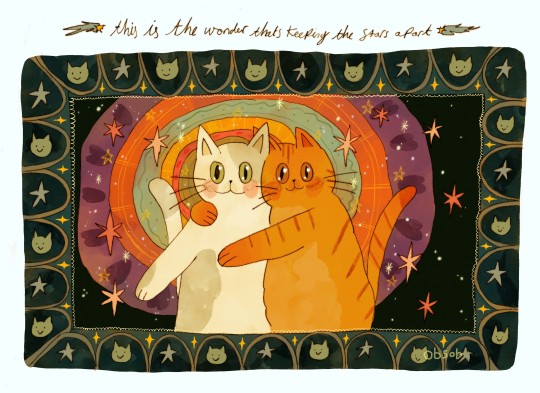
here is the root of the root and the bud of the bud!!
✷(print shop)✷
#mine#original#euheuhe hello..i hope everyone is having a good day#we are going on a bird boat thing on wednesday im very excited about it#what else.....me and my bf went on a walk on sunday and i saw damsel flies and shield bugs and a duck with 13 ducklings#i bought a jellycat sun bag which is now all i talk about#ive started reading assassins apprentice by robin hobb!!!! its so good!!!!#im so excited there are so many books in the series to read#i doubt i will like all of them but i will give them all a go#today i will stop and hve dinner n then walk the dog and then do exercise and have a bath#and then i will. play zelda#and then tomorrow i will do shop stuff and also help my mum buy a bench apparently#i need to buy snacks also. i hve a snack stash in my rooom bc of mental illness purposes and i am low.....need snacks#maybe i will do that tomorrow. brain schedule is full up for today sorry#also. unrelated. i have my period???? again????? ive already had it this month hello i dont need another im good im all done#my hormones r going ??OAGHGHGHUH#also i want like . cute bra. but like not a bra like just cloth thats like. tit shaped. a bralet? is that what that is? no idea#anyway. hve nice evening. or else.#i have a headache#OH ALSO. i need to legally chnage my name SKFSABJSBK#put that on th todo list#i cant rmemeber how 2 do it i think it was very straight forward n cost like. £10 or smth
1K notes
·
View notes
Text
have yet to stop thinking about the plane ride to Barcelona, aka the worlds most awkward plane ride in the world. Like who do we think sat together? Did Devon talk to any of them, like is she’s friends with any of the other teens? Did Eli and demetri drag other people into their drama, was demetri very obviously trying to avoid Eli, messing up the assumed plane seating arrangements? Was Robby brooding over his missing girlfriend and her dead mom the whole time? Were Daniel and Johnny still beefing or do we think they tried to save face for the kids? Is there any chance that Miguel and Sam were able to just have a nice time hanging out with each other on the flight or did they get dragged into everyone else’s drama? I’m so obsessed with the logistics of the Barcelona trip, not to mention the flight is like 11 hours long if it’s non-stop. it sounds like the trip from hell
#Like Devon is implied to be younger than them bc she’s always with Anthony and Kenny so like I don’t think she knows them that well#MAYBE Miguel from eagle fang days but I doubt they’re close and also he is closer to literally everyone else on that flight#Did she just awkwardly sit with Johnny like I know he loves her but it’s still sad#Also I beg the question (which may actually get answered) did Johnny and Daniel like bring their families??????#Like are Amanda and Carmen there? Is Anthony coming just to watch? That feels mean to him#If Anthony didn’t come then I doubt Amanda did which makes me doubt that pregnant Carmen did which then begs the question#Do lawrusso have to share a hotel room and hilarity ensues? To me? Yes#It’s just like I think there’s no way Miguel and Sam escape the binary boyfriends drama which is a shame bc they’re not fighting with anyon#They could have peace but alas#And then you know Robby is going through it#Oh my god it cracks me up so much I haven’t stopped thinking about it#cobra kai
165 notes
·
View notes
Text
can i confess something else that will absolutely get me stoned in the town square since im dropping my unpopular opinions. I don’t like altean broadsword Lance. i already disliked red paladin Lance. the broadsword was like rubbing salt in the wound. why couldn’t he have his own niche. why was his character development just making him keith. i understand that it was like “he accepts that he doesn’t have to be a leader and excels as a co-leader and you can find happiness that way yada yada yada”. but you could’ve done that without making him keith. also now give him something unique, cool, that falls in line with his sniper bit. i’m not saying just give him another gun, im saying give him something quiet and lethal. like a garotte. yeah i want garotte lance.
i yap a lot more in my notes by the way if you were interested in other unpopular opinions. don’t send me hate messages or comments i won’t read it and will block viciously i also will not be debating this this is my hill to die on <3
#voltron#if you wanna hate on me uh maybe don’t#i just also think everyone’s writing was lazy except allura’s by the end#i don’t go into RP/BP klance posts and hate on them so don’t come into my space i’m warning you im liberal with the block button#that’s my OPINIOOONNNNNN#voltron legendary defender#moths unpopular opinions#i hate red paladin lance and black paladin keith im not sorry#i also dislike the idea that the black paladin has a designated right hand man (figuratively)#that feels unfair in a way i can’t explain#to me#black paladin is someone that creates harmony in the group#not necessarily is the Ultimate Most Important dude#but the guy that can listen to all the noise and filter it out and come up with reasonable ideas and facilitate discussion#and make well informed snap decisions to guide the team#i don’t think there’s space for a right hand#moth speaks#lance mcclain#and i hate that shiro got side lined because they shot themselves in the foy#foot#anyways having a lion swap betrays the fundamentals of voltron we were introduced to#you can’t introduce a hard magic system and then say no thanks#like oh ok i guess it doesn’t matter if the lion chooses the paladin whatever#which by the way is my biggest issue with season one#i think it was structured badly and having allura designate lions from the get go also betrayed the principle#which you could argue for the lion swap using that argument but lance is really the only one who was without a doubt chosen by his lion#so#no#anyways#thanks for listening to me yap
78 notes
·
View notes